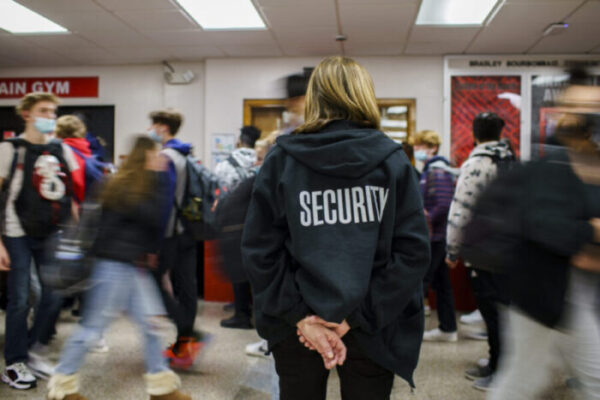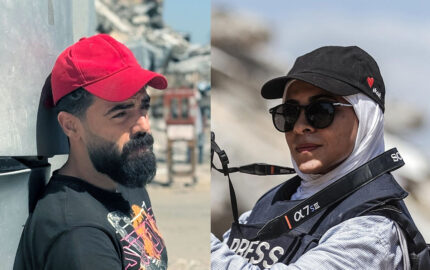“The Price Kids Pay,” a joint investigation by reporters Jodi S. Cohen at ProPublica and Jennifer Smith Richards at the Chicago Tribune, is the winner of the 2022 Worth Bingham Prize for Investigative Journalism.
Cohen and Smith Richards exposed a loophole that for years allowed police in Illinois to routinely issue tickets to children for minor misbehavior, circumventing a 2015 state law that bans schools from fining students as a form of discipline. Students were ticketed for minor misconduct such as littering, swearing or carrying vapes. And, in some ticketing cases, cash-strapped families were forced into debt by fines imposed at administrative hearings.

During their yearlong investigation — the broadest look ever at school-based ticketing in the country — the reporters discovered that police had ticketed students more than 12,000 times over the course of three years with fines as high as $750. Dozens of school districts broke state law by referring students to police for truancy. Expanding on the issue of policing in schools, the reporters also spotlighted a school where children as young as 9 were led into squad cars in handcuffs for bad behavior.
Cohen and Smith Richards filed more than 500 public records requests and built a first-of-its-kind database that revealed the extent of school ticketing in the state. They also attended dozens of ordinance violation hearings, witnessing firsthand the problems students and their families faced while trying to cope with the fines.

Bingham Prize judge Benny Becker praised the compelling, humanizing storytelling saying: “Not only was the reporting dogged and thorough even in the face of great difficulty, it also tied together threads of widespread societal issues. The story had a clear and powerful impact in changing policy and improving lives of those needlessly suffering, which allowed the story to point toward solutions rather than just piling onto the readers’ sense of despair.”
Bingham Prize judge Julia Lurie added: “‘The Price Kids Pay’ has it all — personal stories, data reporting, scope and specificity. The reporting revealed dramatic racial disparities in who’s ticketed. Many municipalities collect on unpaid debt, with long-lasting effects on already-struggling families. To me, this is accountability reporting at its finest: It shows the immense harm caused by a common, predatory, previously unexamined practice and it provoked an immediate response.”
In the course of their work, the reporters revealed that the Garrison School, a small school for children with emotional or behavioral disabilities had called police every other day, on average, resulting in more than 100 arrests in the past five years. The Four Rivers Special Education District, which operates the school, had a greater student arrest rate than any other district nationwide. Representatives from the state board of education have made plans to provide staff training there. The U.S. Department of Education also launched a civil rights investigation to determine whether children enrolled in the school have been denied an appropriate education.

The series led to swift reforms: The state superintendent asked schools to stop the ticketing practice, the Illinois attorney general opened a civil rights investigation, the state comptroller stopped collecting truancy debts and many school districts have changed their discipline policies. The reporting also raised national attention, with some groups pushing the federal education department to begin tracking student ticketing.
In February 2023, new legislation was introduced to amend the state’s school code to make it illegal for school personnel to use police to issue students citations for incidents that can be addressed through a school’s disciplinary process.
Visual elements for “The Price Kids Pay” included photojournalism by Armando Sanchez at the Chicago Tribune and artwork by illustrator Laila Milevski; Ruth Talbot, ProPublica’s news apps developer, built an interactive search tool for public use. The project was overseen and edited by the Tribune’s Kaarin Tisue and ProPublica’s Steve Mills and George Papajohn.
The seven journalists who judged the Bingham submissions this year are Nathan Payne, regional editor for KFF Health News and a 2019 Nieman Fellow; Rebecca Woolington, investigative editor at the Tampa Bay Times and winner of the 2021 Bingham Prize; Corey G. Johnson, a ProPublica reporter and winner of the 2021 Bingham Prize for his work at the Tampa Bay Times; Julia Lurie, a senior reporter for Mother Jones and a 2022 Nieman Fellow; Gabrielle Schonder, a “Frontline” director and a 2022 Nieman Fellow; Benny Becker, a story trainer and co-producer at WMMT and a 2019 Nieman Fellow; and Laura N. Pérez Sánchez, an independent journalist and writer based in San Juan and a 2019 Nieman Fellow. Corey Johnson recused himself from judging the winning entry.
The $20,000 Worth Bingham Prize for Investigative Journalism honors investigative reporting of stories of national significance where the public interest is being ill-served. It is presented annually by the Nieman Foundation for Journalism at Harvard University. Worth Bingham, who died at the age of 34, achieved prominence as an investigative journalist and was vice president and assistant to the publisher for the Louisville Courier-Journal. He was a 1954 Harvard University graduate. His family and friends created the annual prize in his memory in 1967.
The Nieman Foundation for Journalism at Harvard educates leaders in journalism, promotes innovation and elevates the standards of the profession. More than 1,700 journalists from 100 countries have been awarded Nieman Fellowships since 1938. The foundation also publishes Nieman Reports, a website and print magazine covering thought leadership in journalism; Nieman Journalism Lab, a website reporting on the future of news, innovation and best practices in the digital media age; and Nieman Storyboard, a website showcasing exceptional narrative journalism and nonfiction storytelling.



